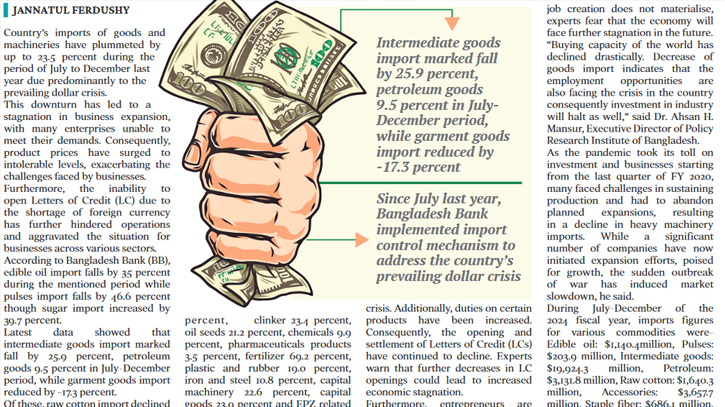
Photo : Messenger
Country’s imports of goods and machineries have plummeted by up to 23.5 percent during the period of July to December last year due predominantly to the prevailing dollar crisis.
This downturn has led to a stagnation in business expansion, with many enterprises unable to meet their demands. Consequently, product prices have surged to intolerable levels, exacerbating the challenges faced by businesses.
Furthermore, the inability to open Letters of Credit (LC) due to the shortage of foreign currency has further hindered operations and aggravated the situation for businesses across various sectors.
According to Bangladesh Bank (BB), edible oil import falls by 35 percent during the mentioned period while pulses import falls by 46.6 percent though sugar import increased by 39.7 percent.
Latest data showed that intermediate goods import marked fall by 25.9 percent, petroleum goods 9.5 percent in July-December period, while garment goods import reduced by -17.3 percent.
Of these, raw cotton import declined by 38.9 percent, textile and articles 13.4 percent, staple fiber -11.6 percent, dyeing and tanning materials 8.4 percent, clinker 23.4 percent, oil seeds 21.2 percent, chemicals 9.9 percent, pharmaceuticals products 3.5 percent, fertilizer 69.2 percent, plastic and rubber 19.0 percent, iron and steel 10.8 percent, capital machinery 22.6 percent, capital goods 23.9 percent and EPZ related import falls by 19.1 percent.
Since July last year, BB implemented import controls to address the dollar crisis. Additionally, duties on certain products have been increased. Consequently, the opening and settlement of Letters of Credit (LCs) have continued to decline. Experts warn that further decreases in LC openings could lead to increased economic stagnation.
Furthermore, entrepreneurs are reluctant to make new investments due to the election year and existing high inflation rates. If investment in job creation does not materialise, experts fear that the economy will face further stagnation in the future.
“Buying capacity of the world has declined drastically. Decrease of goods import indicates that the employment opportunities are also facing the crisis in the country consequently investment in industry will halt as well,” said Dr. Ahsan H. Mansur, Executive Director of Policy Research Institute of Bangladesh.
As the pandemic took its toll on investment and businesses starting from the last quarter of FY 2020, many faced challenges in sustaining production and had to abandon planned expansions, resulting in a decline in heavy machinery imports. While a significant number of companies have now initiated expansion efforts, poised for growth, the sudden outbreak of war has induced market slowdown, he said.
During July-December of the 2024 fiscal year, imports figures for various commodities were- Edible oil: $1,140.4million, Pulses: $203.9 million, Intermediate goods: $19,924.3 million, Petroleum: $3,131.8 million, Raw cotton: $1,640.3 million, Accessories: $3,657.7 million, Staple fiber: $686.1 million, Dyeing products: $417.1 million, Clinker: $448.5 million, Oil seeds: $484.2 million, Chemicals: $1,654.8 million, Iron and steel: $3,203.2 million, Capital machinery: $2,058.8 million, and Capital goods: $3,528.1 million.
During the corresponding period of the previous year, import figures were- Edible oil: $1,752.40 million, Pulses: $382.10 million, Intermediate goods: $25,017.80 million, Petroleum: $3,461.40 million, Raw cotton: $2,683.30 million, Accessories: $4,225.70 million, Staple fiber: $776.40 million, Dyeing products: $455.30 million, Clinker: $585.80 million, Oil seeds: $614.20 million, Chemicals: $1,837.50 million, Iron and steel: $3,590.10 million, Capital machinery: $2,660.10 million, Capital goods: $4,638.10 million.
“In the 40 years of journey, Bangladesh could be able to build a strong infrastructure in the country in manufacturing readymade garments. But currently, we cannot basket work orders.
On the other hand, we cannot open LC, buy raw material due to dollar crisis,” Shahidullah Azim, vice president of Bangladesh Garment Manufacturers and Exporters Association (BGMEA) said.
Due to the dollar crisis, the government and BB have taken various steps to rein in the import of luxurious and unnecessary goods. Even after seven months of the FY, the negative trend continues. The import of all products, including capital machinery, industrial raw materials, which are most necessary for setting up new industries, has decreased.
Economists anticipate that this trend will persist throughout the remaining months of the financial year, exerting a detrimental effect on investment in the country. The anticipated decrease in industrial production is expected to further compound the negative impact on the economy overall.
Messenger/Disha








